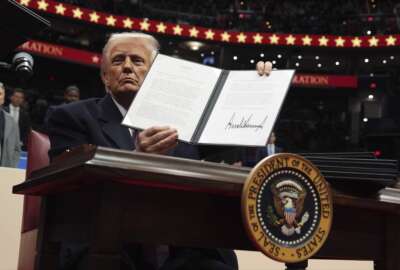Steve Bucci, Allison Center Director, Heritage Foundation
The Pentagon announces more successful air strikes against the Islamic State militants in Iraq and Syria. The new year hasn't brought a new policy in dealing with...
The Pentagon announces more successful air strikes against the Islamic State militants in Iraq and Syria. The new year hasn’t brought a new policy in dealing with the Islamic State, but more American advisers are on the ground in Iraq. And 2015 may be the year that calls for more of an American military presence in both countries to get louder.
Steve Bucci is Director of the Allison Center for Foreign and National Security Policy at the Heritage Foundation. He’s former Deputy Assistant Secretary of Defense, and a retired Army Special Forces officer. He shared his Top 3 for 2015 on In Depth with Francis Rose. He said decisions the enemy makes may force the hand of the United States.
Steve Bucci’s Top 3 for 2015
- No Boots on the Ground: The administration’s policy toward the Islamic State Militants in Iraq and Syria must and will be adjusted. The effects thus far have been less than what is necessary to accomplish or even approach the President’s goals. This will lead to a deep debate over how to adjust it. The White House will eventually embrace the suggestion of Chairman of the Joint Chiefs of Staff Martin Dempsey and authorize Special Operations Forces (SOF) to embed with the Iraqi, Kurdish and eventually Syrian forces fighting the Islamic Stte. He will make the argument (suggested by some from the start) that these mature professionals are different than Army or Marine line troops, (infantry, armor, etc.) and therefore do not constitute “real” boots on the ground. If combined with upgrades in the number and type of airstrikes, this change could turn the tide in this fight, and see the Islamic State militants driven back into tangential significance.
- Remotely radicalized terror will grow: These incidents which incorrectly are called “lone wolf” events (think Canada, Australia, New York City and Oklahoma) are the wave of the terrorist future. Individuals or small groups, some with mental health issues, or at least disaffected personalities, will become radicalized by online propaganda and general “instructions” from the Islamic State, al Qaeda or other radical Islamists. They will then execute terrorism on the cheap. These events are nearly impossible to predict or stop, as they are “invisible” to LEA and intel. The only good side is that these types of attacks are also very small scale and low grade as compared to blowing up buildings or a 9/11 style attack. How we adjust to combat these preemptively will be the big challenge.
- The defense budget: Sequestration is still on the table, only delayed. The ax is still raised, and this breeds uncertainty. While some have opined that the looming presidential campaign will “drive” both parties to compromise so as not to be vulnerable to criticism as weak on defense, I think this is being overly optimistic as to the common sense ability to “see the light.” U.S. military readiness has gone down, and that trend will continue until we fix the budget impasse. 2015 would be a great year to do so.
In our special radio report, Top 3 for 2015, federal experts tell In Depth host Francis Rose what top three concepts, trends or priorities they believe will be important in 2015.
Copyright © 2025 Federal News Network. All rights reserved. This website is not intended for users located within the European Economic Area.





